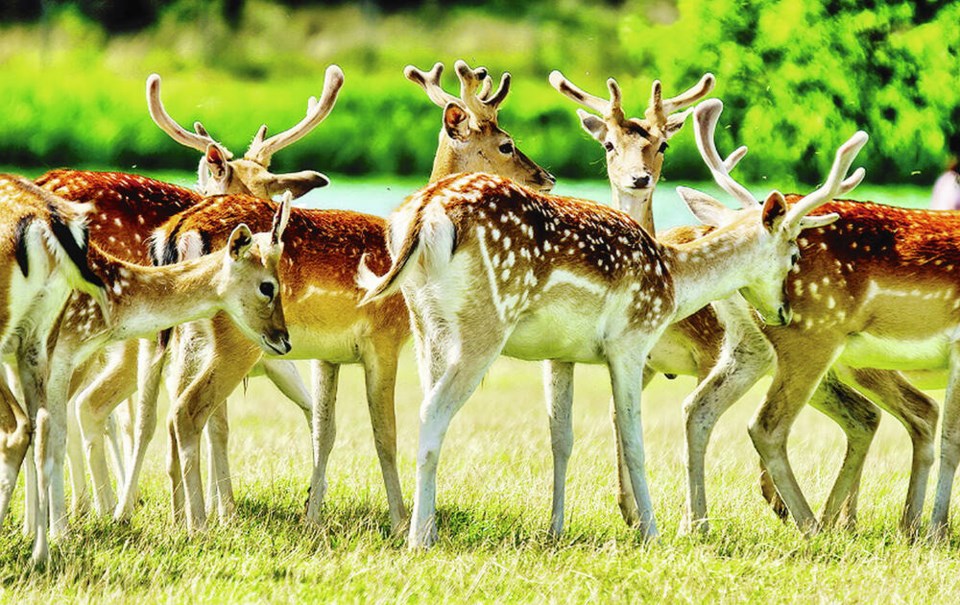A commentary by an emeritus professor of wildlife biology at McGill University. He lives in North Saanich.
The B.C. Society of the Prevention of Cruelty to Animals has done a great deal of good for animals in British Columbia. Their stated mission is “to protect and enhance the quality of life for domestic, farm and wild animals in B.C.”
So, my question is this: How can this same organization be involved with the Parks Canada inhumane killing of deer on Sidney Island?
The plan to use helicopters for aerial gunning with restricted semi-automatic rifles is inhumane. The use of dogs to round up deer, herding and hunting from boats and other practices are all considered cruel practices, and therefore illegal.
I write from the perspective as someone who is intimately familiar with the fallow deer situation on Sidney Island and as someone who taught wildlife management and conservation at McGill University for 35 years.
What exactly is the B.C. SPCA’s involvement? Parks Canada, in a letter dated Nov. 14, stated that: “The project partners have consulted with the B.C. SPCA throughout project planning.”
Parks “have hosted the SPCA’s Manager of Wild Animal Welfare on-site to discuss the details of the operation, and are sharing operational details with the B.C. SPCA for additional review.”
“Representatives from the B.C. SCPA will be on site during the operation to observe activities from an animal welfare perspective.”
It is abundantly clear that the SPCA has been deeply involved from the very start of this project.
How can they be part of this? The B.C. SPCA has very clear position statements regarding killing of animals:
“The B.C. SPCA believes that the methods used to kill any animal must be humane. The B.C. SPCA can only consider a method of animal killing to be humane if it either kills an animal instantly or it first renders the animal insensible to pain until death ensues.
“The handling methods, equipment and facilities used must also ensure that animal fear, pain and anxiety are kept to absolutely minimal levels prior to and during killing”
“Killing from helicopters isn’t humane.”
“Even by the most skilled shooters, this is challenging to achieve (especially from a helicopter) and causes excessive stress during the chase. There is no way to confirm death was quick or without suffering.”
“Hunters should not attempt to kill unless they can reasonably expect a successful lethal shot and should limit the shot distance to within their individual marksmanship.”
“Ethical hunting does not cause hunted animals unnecessary harm or stress (e.g., using hunting dogs).”
The Parks Canada hunt breaches every single one of these SPCA principles.
Hunting from a helicopter using guns that will be “spray shooting” may not instantly kill an animal. Herding by helicopters, dogs and boats causes immense stress. The animal fear, pain and anxiety will not be kept to absolutely minimal levels prior to and during killing.
Moreover the entire population of native black-tailed deer will be killed, since neither the aerial shooters nor the dogs can differentiate these from the fallow deer. How can the SPCA support this “collateral damage”?
Although Parks Canada indicates that the resulting deer meat will be distributed to First Nations in an attempt to win public support, the truth is that deer killed by aerial gunning and high stress tactics will largely contain inedible meat.
The bottom line is that this mass killing will provide little usable food for First Nations and thus, be nothing more than a shocking waste of this resource.
I strongly urge the B.C. SPCA to reconsider their involvement with this project. They are providing the stamp of legitimacy to an inhumane slaughter that does not have widespread public support.
An online petition against this action has 20,942 signatures. My guess is that supporters and donors may well think twice before giving a generous Christmas donation to the B.C. SPCA.


